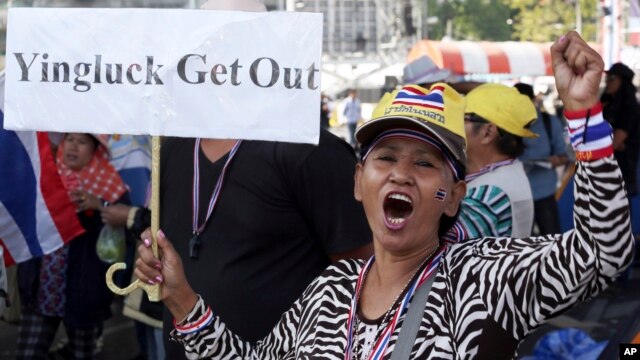
A Thai anti-government protester holds a placard and chants slogans during a rally at Victory Monument intersection, Jan. 21, 2014 in Bangkok, Thailand.
BANGKOK — Thailand’s government has imposed a 60-day state of emergency in Bangkok and surrounding provinces following months of protests by anti-government demonstrators in the capital.
The deputy interior minister announced the new measures Tuesday, giving security forces new powers to ban political gatherings of more than five people, censor news media, impose curfews and detain subjects without charge.
For weeks, authorities have worried about the country’s ability to conduct the vote during the continuing demonstrations in downtown Bangkok, but have said they have no legal option for delaying elections.
Protesters in the capital have demanded a halt to the vote and the appointment of an unelected council to impose broad political reforms before holding another election. After the country’s opposition Democrat Party decided to boycott the vote, protesters then prevented scores of candidates for registering for the election to undermine its legitimacy.
Smarn Lertwongrath, a senior advisor for the ruling Pheu Thai party says the election will go ahead despite possible problems for voters in Bangkok and in the southern provinces, where protesters largely succeeded in blocking candidate registrations.
"It will take place; we are certain on the 2nd of February there will be an election - only some problem in Bangkok and in [the] Southern provinces. But it's not the big provinces and in the end there will be another two or three [bi-] elections and I'm sure the election will be complete," Lertwongrath said.
Thailand's Election Commission has repeatedly warned the government over possible disruptions to the February polls, including insufficient volunteers to man the polling booths.
On Tuesday, the commission said it would seek advice from the Constitutional Court on setting a new date for polls if next month's vote fails to proceed smoothly.
The emergency decree raises the possibility that security forces may abandon the largely hands-off policy they have taken with Bangkok’s protests so far. Demonstrators have been allowed to set up camps and march through the city’s busiest streets each day, and regularly occupy government ministries to try to keep them from functioning.
But the violence has increased as the protests have worn on. Daytime grenade attacks have wounded scores and killed at least one person in recent days. The government and opposition have accused each other of being behind the attacks. The Thai Army has expressed concern after intelligence reports suggested weapons and explosives being stockpiled in the capital.
On Monday, protesters invaded the offices of the Justice Ministry's Department of Special Investigation (DSI). The department chief, Tarit Pengeid, reacted angrily.
Tarit says he condemns the protesters' behavior for having forced officials from the building. He says they later locked down access to the offices.
Thailand's current bitter and protracted political battle comes as urban middle class voters charge that Ms. Yingluck's older brother, Thaksin Shinawatra, has an excessive control over the government despite living overseas to avoid a jail term for corruption
Thaskin, ousted in a coup in 2006, built substantial voter support in the northern regions and urban working class through populist policies targeting the poor.
But a blanket amnesty bill passed by the ruling party in late October was seen as clearing the way for Thaksin's return to Thailand free of criminal charges, triggered tens of thousands to protest. The government later annulled the bill and called for fresh elections, saying polls were the way out of the crisis. |
|
